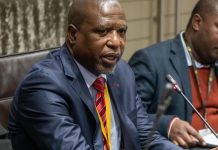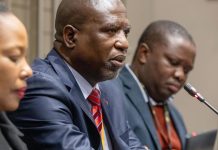Africa-Press – South-Africa. Real recovery will only be possible if international tourism returns’. Rich Mkohondo explains why he thinks the Tottenham deal is necessary.
“It is in tourism that nature and humanity meet most equitably and profitably. Like with other countries, not only does the tourism industry bring the many cultures and nations of the world to our door-step and so expand our own world view. It also provides the resources for the conservation of our natural heritage,” President Nelson Mandela said 28 years ago.
Addressing the Indaba International Tourism Workshop, Durban, on the 1 May 1995, exactly a year after his inauguration, he added:
Unfortunately the tourism industry has been regarded by the vast majority of our people as an [elite] activity, reserved for a privileged few. The South African tourism industry is rising to the challenge of changing this image.These views expressed by our first democratically-elected leader remain relevant almost three decades later. South African Tourism (SAT)’s mandate is to rise to the challenge to make sure tourism creates jobs, strengthens local economies and helps reduce poverty and inequality.
SAT mandate
Describing its mandate, South African Tourism says: “South African Tourism is the tourism marketing arm of the South African government. Simply put, our job is to promote the country domestically and internationally, whether for leisure, business or events tourism.”
The SAT strategy to sponsor Tottenham Hotspur, one of the English Premier League’s best-known teams, is at the heart of this mandate and the fact that tourism offers great opportunities for emerging economies and developing countries such as ours.
The truth is our country’s tourism potential has barely been scratched. The answer lies in ingenuity, innovativeness and how we package, market and sell our tourism products, including destination marketing.
SAT mandate and social ills
Unfortunately, SAT’s mandate is sandwiched by our nation’s increasing lawlessness, fading democratic values, stories of corruption, bribery, looting, abuse and wastage of state resources, the staggering rate of unemployment, the high rates of domestic violence, infrastructure decay and the energy availability factor precipitating daily different stages of load shedding .
It is therefore not surprising that sponsoring Tottenham has sparked a debate on conflicting priorities, with many saying our nation requires careful assessment of our priorities according to local needs and circumstances, such as dealing with the energy crisis, rampant crime, unemployment and especially sports development. The truth is these priorities are outside SAT’s mandate and responsibility.
Indeed, the debate is whether government priorities are all wrong.
The truth is everyone has their own priority. For example, for some, education and unemployment are the most important problems the youth in the country want the government to address.
I agree with SAT acting chief executive officer Themba Khumalo when he said: “Money invested in tourism is not the same money as required for energy or potholes. Our mandate is to spend money to persuade travellers to come to South Africa to spend money. That is what we’re legislated to do.
“Sport and entertainment are audience aggregators, so people will pay money to have you access their product.
“Our deal has nothing to do with football because ours is to access the viewers who watch the football to become part of the travelling market to South Africa.”
Moving away from the beaten track
The role of tourism in our country’s social and economic development cannot be underestimated.
According to Statistics South Africa, travel and tourism contribute 8.6% to the South African economy and provide for 9.2% of total employment within the country.
Indeed, tourism has many facets. It has a considerable impact on the growth of sectors such transport, banking and financial services. Overall, it is a source of both direct and indirect employment.
We need to move away from the beaten track. One way of doing this is to be adventurous through initiatives such as the Tottenham sponsorship.
Despite the energy crisis, rampant crime, poverty and rising unemployment and other social ills, one of SAT’s overarching goals of reconstruction should be to help transform our economy, and tourism is one of the greatest enablers of such reconstruction.
Unfortunately, SAT’s job is made difficult by the fact that our country’s brand, which is an important component to national development given its effect on global trade, investments, tourism and diplomacy is being severely battered. We are slowly being written off as a failed state. We are failing SAT.
Benefits of country branding
As an admirer of country branding, having a strong image gave our nation gravitas. Now I cry as I see the flame of our brand die. For years I have followed and enjoyed how countries brand themselves. I clearly remember New Zealand’s “Forever Young”, which perfectly captured the youthful energy of the country’s young population. Incredible India and Malaysia’s “Truly Asia” attesting the integrity and spirit of these Asian tigers.
I have admired how Singaporeans have established themselves as a competent, hard-working and law-abiding nation and how South Koreans have endeared themselves as a country whose culture charms the world.
I have marvelled at how France is associated with chic, Great Britain with class, Sweden with design, Germany with engineering and Switzerland with precision. The above countries have shown us that destination marketing takes into account different things: tourism, exports, people, policy, culture and investment and most importantly, moral leadership.
Unfortunately, tourism was one of the sectors’ hardest hit by the coronavirus pandemic, and destinations that rely heavily on international, business and events tourism are still struggling.
Post Covid tourism
Many countries are now developing measures to build a more resilient tourism economy post Covid-19. These include preparing plans to support the sustainable recovery of tourism and rethinking tourism for the future. That is exactly what SAT is trying to do with the Tottenham sponsorship.
Fortunately, domestic tourism has restarted and is helping to mitigate the impact on jobs and businesses in some destinations across our country, particularly in coastal destinations.
For More News And Analysis About South-Africa Follow Africa-Press






